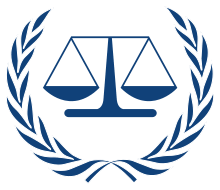Twenty-third Amendment of the Constitution of Ireland
The Twenty-third Amendment of the Constitution of Ireland permitted the state to become a party to the International Criminal Court (ICC). It was effected by the Twenty-third Amendment of the Constitution Act, 2001, which was approved by referendum on 7 June 2001 and signed into law on the 27 March 2002.
Changes to the text
- Insertion of new Article 29.9:
The State may ratify the Rome Statute of the International Criminal Court done at Rome on the 17th day of July, 1998.
Overview
The Twenty-third Amendment of the Constitution was necessary because the Statute of the International Criminal Court granted to the ICC certain powers the constitution, as it stood, vested exclusively in the organs of the national government. The Twenty-third Amendment was introduced by the Fianna Fáil–Progressive Democrats coalition government of Bertie Ahern and was supported by every major political party. It was submitted to a referendum on the same day as the Twenty-first Amendment, which introduced a constitutional prohibition on the death penalty and was approved by the electorate, and the Twenty-fourth Amendment Bill which would have permitted the state to ratify the Treaty of Nice but was rejected by voters. Voting on the Twenty-third Amendment went 64.2% in favour and 35.8% against.
The Twenty-third Amendment followed directly after the Twenty-first Amendment. This is because, for technical reasons, there is officially no Twenty-second Amendment of the Constitution of Ireland. While the changes shown above are those made to the English-language version of the constitution, constitutionally it is the Irish text that takes precedence.
Result
| Choice | Votes | % |
|---|---|---|
| |
629,234 | 64.22 |
| No | 350,512 | 35.78 |
| Valid votes | 979,746 | 98.21 |
| Invalid or blank votes | 17,819 | 1.79 |
| Total votes | 997,565 | 100.00 |
| Registered voters and turnout | 2,867,960 | 34.78 |
See also
- Politics of the Republic of Ireland
- History of the Republic of Ireland
- Constitutional amendment
- Irish constitutional referendum, 2001
References
- ↑ "Referendum Results" (PDF). Department of the Environment, Community and Local Government. Retrieved 12 March 2012.
